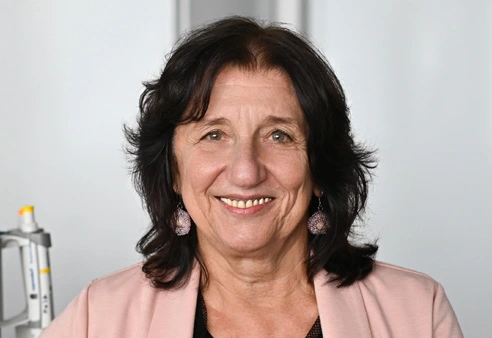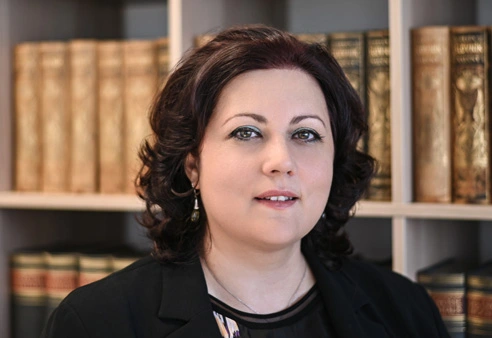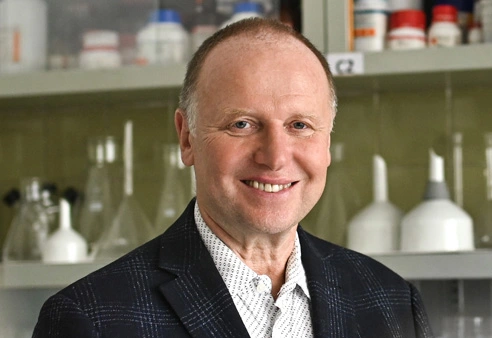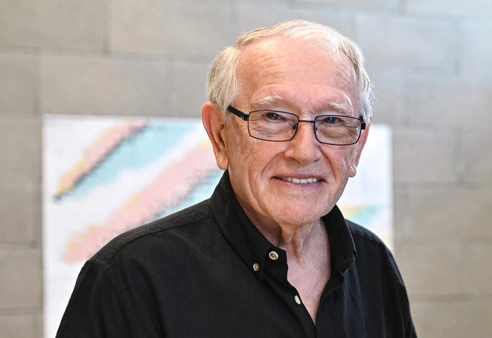“Glass is a beautiful aesthetic material that’s remarkable for being recyclable and hygienically safe at the same time,” says Professor Ing. Dušan Galusek, DrSc, who researches new types of materials. He is the director of FunGlass, the Centre for Functional and Surface Functionalized Glass at the Alexander Dubček University of Trenčín.
At first, he was an expert on ceramics; later he switched his focus to glass. This material has very individual and specific technical and technological properties that are often unknown to the public, even though glass is everywhere around us and we should have perfect knowledge of it.
Professor Galusek researches glass from several perspectives. One such fascinating and useful perspective is the possibility of using glass in the human body, for example as a replacement for bones. “There’s ongoing intense research in this area being done not only here but elsewhere in the world as well. Bioactive glasses can gradually dissolve in the body and release substances with therapeutic effects. The effects can be anti-bacterial, [and] they can encourage the formation of bones and blood vessels,” says Professor Galusek. In an ideal scenario, bioactive glass would dissolve only when it would be replaced by new natural and healthy tissue. This is not exclusive to bones. Today, researchers are able to prepare bioactive glasses in the form of nanoparticles with added bioactive polymers that then serve as soft matrices. These glasses then can be used as a source of therapeutic ions in, for example, the regeneration of soft tissues such as cartilage or skin.
“Science should be helping people. Naturally, that takes time, especially with bioactive materials [where] there is the issue of safety and harmlessness assessment, and overall material certification. Such a journey can take up to a decade,” says Professor Galusek.
Professors Galusek’s team also deals with the use of pharmaceutical glass that is not recyclable, as opposed to other types of glass that most people usually recycle. “That’s why we are looking for ways and methods of using it and transforming it into a useful product. Pharmaceutical glass is, by its nature, very high quality and stable but it doesn’t recycle due to concerns regarding the quality of the recyclate,” he explains. The COVID-19 pandemic has produced a large amount of syringes, drugs and vaccine packaging that has not found any secondary use. The efforts of Professor Galusek’s team may change that, thanks to their research into the use of such glass in waste water filtration. They also focus on contactless temperature measurement and the use of glasses as luminophores in energy saving light sources.
Before Professor Galusek decided to study ceramics as a new material, he had considered pursuing archaeology and at one point he thought he would end up working in a cement plant. He didn’t want to work in an industrial environment, though. He finally took up an offer from his alma mater and later became a postgraduate student at the Faculty of Chemical and Food Technology of the Slovak University of Technology. He got into glass, his main area of focus, later, at the Institute of Inorganic Chemistry of the Slovak Academy of Sciences and afterwards at the Alexander Dubček University of Trenčín, where he founded and to this day directs the international science Centre for Functional and Surface Functionalized Glass (FunGlass). It is the only centre of excellence to be founded in Slovakia in 2017 as part of the Horizon 2020 programme. The centre does European-level research and has attracted expert researchers from various fields and all across the world to the region. Professor Galusek considers establishing the centre to be the greatest success of his career.
For him, as a Trenčín local, it’s more than home-town patriotism, though. Despite having worked in Germany and the United Kingdom, he feels freer in a smaller city. He prefers to be close to nature. Additionally, he likes to cycle, kayak, and read books, especially historical ones, when he has free time for them.



